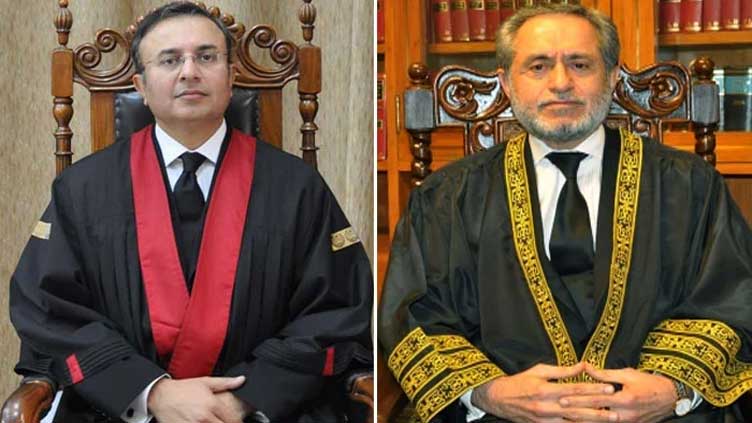Justices Mansoor, Mandokhail stand up for full court empowerment

Pakistan
Judges question CJP's jurisdiction to take suo-motu notice
ISLAMABAD (Dunya News) – Supreme Court’s (SC) two judges, Justice Mansoor Ali Shah and Justice Jamal Mandokhail, questioned Chief Justice of Pakistan Umar Atta Bandial’s jurisdiction to take suo motu notice in their detailed dissenting notes issued on Monday.
Their notes come as the SC’s five-member bench is hearing a plea against the Election Commission of Pakistan’s (ECP) decision to postpone elections in Punjab until October 8, wherein the filer, the PTI, had stated that the ECP took the step in contravention to the apex court’s orders. The SC had, earlier, ordered the ECP to hold elections in Punjab and KP within ninety days of the dissolution of assemblies in a suo motu notice taken by the CJP.
The five-member bench, headed by the CJP, comprised Justice Ijazul Ahsan, Justice Jamal Khan Mandokhail, Justice Muneeb Akhtar Sheikh and Justice Ameenuddin Khan.
The dissenting judges remarked that four SC judges, in a seven-member bench, had rejected the CJP’s suo motu notice. They further remarked that the jurisdiction of the “one man power show” must be reviewed, adding that the apex court could not be left to one man’s authority and it was time to end the CJP office’s jurisdiction to enjoy suo motu notice.
Read More: Justices Minallah, Yahya question very spirit of suo motu
When caprice and convenience of the judges takes over, we enter the era of an “imperial Supreme Court”, the judgment read. A full court must be summoned to constitute policy regarding the jurisdiction on taking suo motu notice, added the judgment.
Earlier, a seven-member bench, formerly comprising nine judges, had been constituted to hear the CJP’s suo motu notice on holding elections in Punjab and KP. Two judges distanced themselves citing objections to the formation of the bench while another two judges wrote dissenting notes, thus, opening the apex court for admission of the plea with 3-2.

